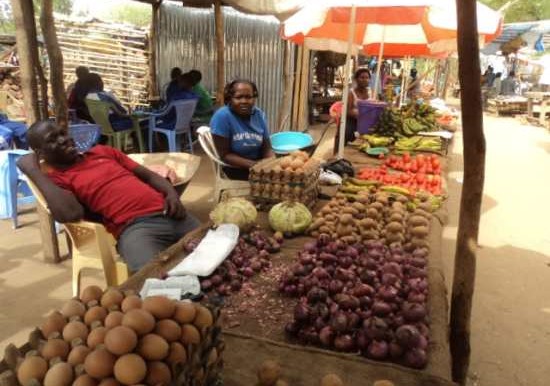Residents in South Sudan’s Eastern Equatoria State have complained about high commodity prices and salary delays as Christmas fast approaches.
The majority said that even if salaries are paid, they will not be able to afford commodities due to inflation and the high prices of both food and clothes.
Civil servants in the state last received salaries in June and are still waiting for their salary arrears.
“We receive 1,500 SSP while a cloth in the market is 15,000 SSP for one kid and if we add shoes it will be 20,000 SSP. It becomes difficult for us government workers to buy clothes, even the second-hand clothes you find that trousers cost 1,500 SSP, it is very difficult and even if they bring the salaries for the last six months, it will still not be enough. It will not buy clothes for six children at home,” Grace Abau told Radio Tamazuj.
Abau added that she will have to explain the challenges they face to their children who expect a lot during Christmas.
Yolanda Kaka, another citizen whose family depends on charcoal burning, worries prices will not change unless the dollar rate reduces.
“What is affecting me and my family is the expensive prices, like us with big families, my husband is not working and we usually go to the bush to cut trees and burn charcoal to survive. Things will only change in the market if the dollar reduces,” Kaka said. “During this Christmas, I will ferment the alcohol and tell children to bear with the little money. We will buy some food, maybe two bowls of food to eat and celebrate at home.”
Aieteng Patrick Oliha accused the government of all the crises in the country saying the current salary structure does not favor the majority of citizens.
“I want to tell the government that they are the ones implementing activities in this country, they should have been the one to change the attitude of the population to end these crises. They should return life to normal like in the past because even the government salary is too small and will not help anything. Even clothes we cannot buy, maybe if we get, the little will be used for food,” Oliha said. “Both economically and politically we are affected because the government does not implement policies. It would have been the role of government to strengthen security and reduce crises so that people stay in peace.”
Meanwhile, the secretary-general at the state chamber of commerce, John Mayen Ngun, confirmed that the prices of clothes have increased due to the Christmas season, foreign exchange, and the cost of transportation from other countries.
The chamber of commerce however says they have been working hard with the government every month to ensure the prices do not shoot too high.
“Clothes are the ones that have increased abnormally but when it comes to January it will reduce because demand will be very low. When we come to the issue of food items, when we reflect October, November, the sack of flour cost 12,000 SSP per 50 kg bag but now there is an addition of 1,000 SSP on top, not much addition, this is because of inflation as you also know how the economy of this country is going so there has been steady prices of food but also you know traders are experiencing the cost of transportation from the point of production up to here,” Mayen explained.
He attributed the fairly stable prices in the state to the collaborative work of the chamber of commerce and the proximity of the state to the border.
The director-general for commerce trade and industry in Eastern Equatoria State said the increase of commodity prices is due to inflation in the country.
Stephen Ihude Oduho who lectures economics at Equatoria International University said the pound is losing value every day against foreign currencies but says the government has been cooperating with the business community to ensure the prices do not go higher.
He explains that the current price changes are an adjustment to the economic crisis.
“The increase of prices in the market in Torit, the state and the country is a reality but of course the influence of exchange rate in the parallel market is also playing a role as of the last three weeks. The South Sudanese Pound continues to lose value against the US dollar and other regional currencies,” Ihude said. “Over 10% have increased apart from the increase in the previous months of November and October but the good thing with Torit is that we had been cooperating with traders. It is not an increase but an adjustment, they have increased prices to adjust to the market fundamentals like the change in the currency so the percentage change in the currency has been translated into the prices.”




